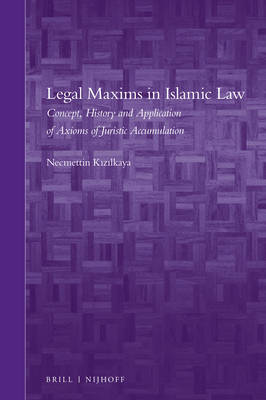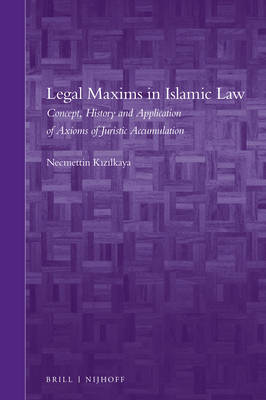
- Afhalen na 1 uur in een winkel met voorraad
- Gratis thuislevering in België vanaf € 30
- Ruim aanbod met 7 miljoen producten
- Afhalen na 1 uur in een winkel met voorraad
- Gratis thuislevering in België vanaf € 30
- Ruim aanbod met 7 miljoen producten
Zoeken
Legal Maxims in Islamic Law
Concept, History and Application of Axioms of Juristic Accumulation
Necmettin Kızılkaya
€ 317,45
+ 634 punten
Omschrijving
The historical development and functions of legal maxims have not been studied within their context in contemporary scholarship. Especially in studies which examine legal maxims as a genre, this is mostly done in a bibliographical and descriptive manner. This leaves the question of why this genre has emerged in Islamic law. This study examines the legal maxims in terms of conceptual and historical development and their application. It analyses the subject from a viewpoint of cause-and-effect rather than examining it in a descriptive manner. Both handwritten manuscripts and printed legal maxims titles have been used for writing this book and the subjects are mostly examined based on primary sources.
"This book is a groundbreaking work on the subject of Islamic legal maxims. It addresses these maxims from a conceptual, historical, and implementational perspective and uses very rich content to elucidate the subjects presented to the reader." - Saffet Köse
"Kızılkaya's book brings new materials and insights into the still emerging field of legal maxims, expanding and deepening the narrative of this genre's development down to the nineteenth century, and including a coverage of works written in Ottoman Turkish. A seminal contribution, the work is essential in understanding this area of Islamic law." - Wael B. Hallaq
"In today's world, legal principles offer Islamic law one of the best opportunities to communicate with ethics and legal disciplines. Necmettin Kızılkaya's book Legal Maxims brilliantly monitors the development of this concept, which is crucial for Islamic legal theory and practice in the post-classical age. It also presents the reader with a comparative view of how legal principles are handled in each of the schools of Islamic jurisprudence." - Murteza Bedir
"In his important contribution to the literature in Islamic Legal Studies on the "maxim," which he characterizes as a type of "universal proposition," Kızılkaya provides deep and wide-ranging historical readings with careful attention to concepts, genres and applications." - Brinkley Messick
"This book is a groundbreaking work on the subject of Islamic legal maxims. It addresses these maxims from a conceptual, historical, and implementational perspective and uses very rich content to elucidate the subjects presented to the reader." - Saffet Köse
"Kızılkaya's book brings new materials and insights into the still emerging field of legal maxims, expanding and deepening the narrative of this genre's development down to the nineteenth century, and including a coverage of works written in Ottoman Turkish. A seminal contribution, the work is essential in understanding this area of Islamic law." - Wael B. Hallaq
"In today's world, legal principles offer Islamic law one of the best opportunities to communicate with ethics and legal disciplines. Necmettin Kızılkaya's book Legal Maxims brilliantly monitors the development of this concept, which is crucial for Islamic legal theory and practice in the post-classical age. It also presents the reader with a comparative view of how legal principles are handled in each of the schools of Islamic jurisprudence." - Murteza Bedir
"In his important contribution to the literature in Islamic Legal Studies on the "maxim," which he characterizes as a type of "universal proposition," Kızılkaya provides deep and wide-ranging historical readings with careful attention to concepts, genres and applications." - Brinkley Messick
Specificaties
Betrokkenen
- Auteur(s):
- Uitgeverij:
Inhoud
- Aantal bladzijden:
- 324
- Taal:
- Engels
- Reeks:
- Reeksnummer:
- nr. 15
Eigenschappen
- Productcode (EAN):
- 9789004444669
- Verschijningsdatum:
- 18/03/2021
- Uitvoering:
- Hardcover
- Formaat:
- Genaaid
- Afmetingen:
- 155 mm x 235 mm
- Gewicht:
- 665 g

Alleen bij Standaard Boekhandel
+ 634 punten op je klantenkaart van Standaard Boekhandel
Beoordelingen
We publiceren alleen reviews die voldoen aan de voorwaarden voor reviews. Bekijk onze voorwaarden voor reviews.








